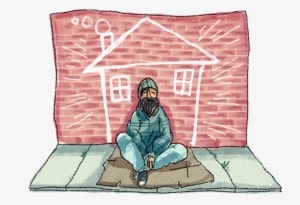|
Living on the streets or in public spaces means constantly being vulnerable. This includes being susceptible to natural disasters, to illness, and to the system and people we have in place to ideally protect us: law enforcement and our criminal justice system. Cities are responding to growing frustrations towards homelessness from the public with a new tactic; legislation designed to hide the homeless rather than help them.
Being homeless is not explicitly illegal in the United States, but currently there are civil and criminal laws which make the behaviors of homeless people illegal. “Law enforcement threatens or punishes homeless people for doing things in public that every person has to do. This includes activities such as sleeping, sheltering oneself, asking for donations, or simply existing in public places.” It also includes arbitrarily enforcing other laws, and the practice of sweeps, which displaces homeless people from outdoor public spaces through harassment, threats, and evictions from living in camps. These activities make it very difficult for homeless people to exist without committing a crime. A report from the National Homelessness Law Center tracked the upwards trend of criminalizing homelessness in 187 cities and found that it actually has an adverse effect. In these cities, the practices of camping in public increased by 92%, begging increased by 103%, and loitering increased by 35%. These trends happen for many reasons, but partially because certain periods of incarceration under laws criminalizing homelessness directly harms a person’s ability to maintain or access public housing. Furthermore, when a homeless person has been arrested for unavoidable behavior, they now have a criminal record and will often miss work for an extended period of time. This creates barriers that lessen the likelihood of employment or losing a pre existing job. Also, court costs associated with resolving or appealing a case can amount to hundreds, or even thousands of dollars. Individuals who do not have the resources to pay are then subject to additional jail time, once again interrupting any chance at maintaining employment. In these ways, an arrest or conviction can lead to lifelong barriers. The consequences of civil penalties are similar, as unpaid tickets lead to bad credit scores which can easily bar a person from housing access. Unpaid tickets can also lead to the suspension of one’s driver’s license or repossession of a vehicle, which drastically limits the prospects of work for that person. The 2019 federal court case Martin v. City of Boise, involved 6 residents of the city who had experienced homelessness and were arrested or cited due to violating a city ordinance that made it a misdemeanor to use “any of the streets, sidewalks, parks, or public places as a camping place at any time.” The plaintiffs claimed this was a violation of their 8th amendment Constitutional rights, which prohibits cruel and unusual punishment. The court ruled that cities can not arrest or punish people for sleeping on public property unless they provide adequate and accessible indoor accommodations. While this ruling acknowledged the fact that it is unfair to criminalize individuals for behaviors that are unavoidable, and presumed they had a choice in the matter, there are still too many people in local governments who think the right answer to homelessness is arresting people. The majority of cities have too few shelter beds, this shortage has been made worse since federal funding was scaled back in 2012. Our system gravitates towards the easiest and quickest solution to homelessness, which is arresting people and getting them out of sight; however, this is far from an adequate solution, as whether people are in jail or on the streets, they nevertheless remain homeless. This “solution” is an attempt to avoid the core issues of homelessness and does not offer people the necessary resources to alleviate the barriers that cause homelessness in the first place.
1 Comment
|
BLogArchives
July 2024
Categories |
©2022 Chicago HOPES for Kids. All Rights Reserved.
Website by Gumbo Media
Website by Gumbo Media


 RSS Feed
RSS Feed
